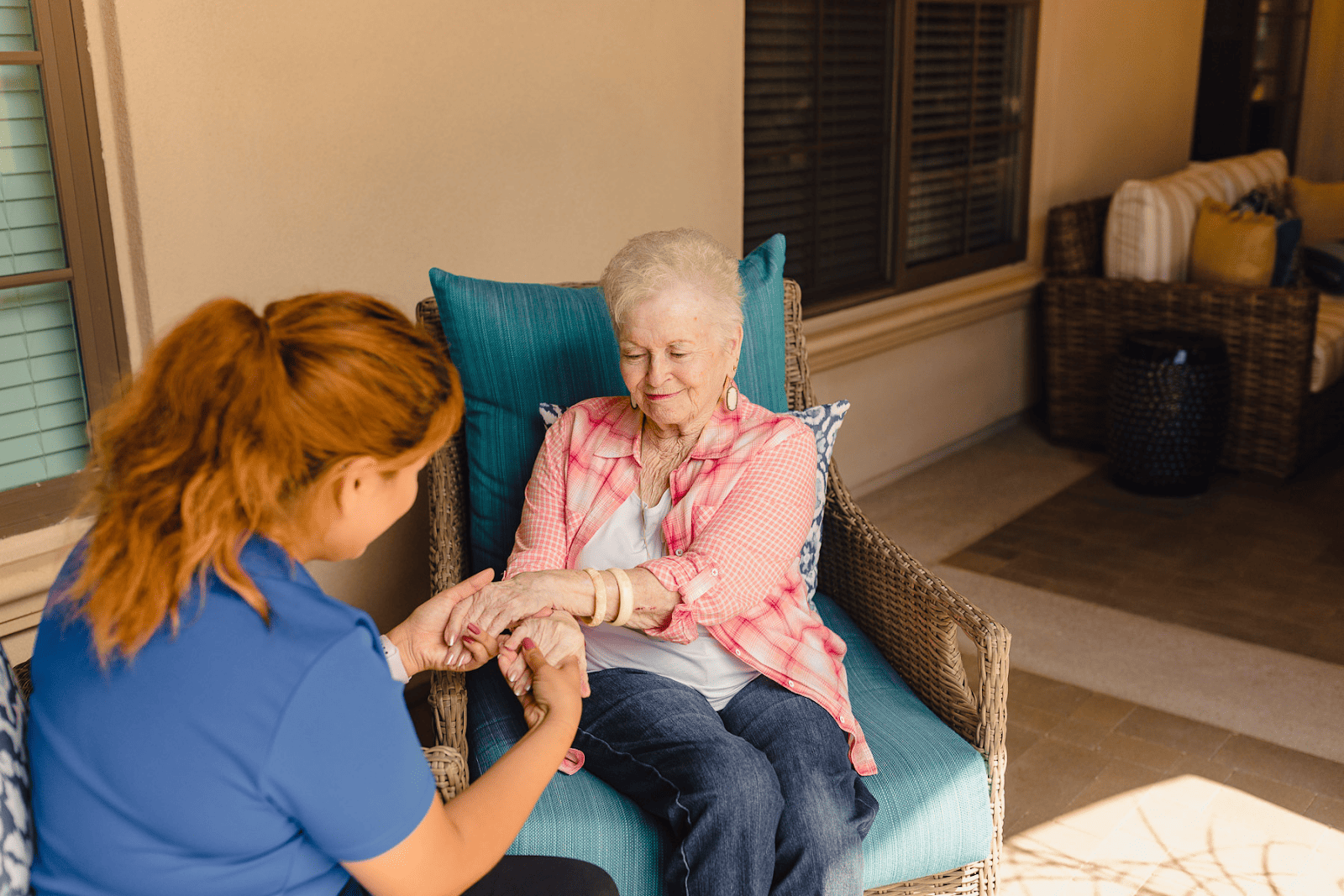Caregivers of loved ones experiencing memory loss, and who suspect the cause may be Alzheimer’s or dementia will want to hear the latest updates on Alzheimer’s care, detection, and treatment.
The Kensington Redondo Beach hosted “Breakthroughs in Alzheimer’s Detection & Treatments” with behavioral neurologist Dr. Sarah Kreman from Cedars-Sinai Medical Center, to discuss groundbreaking progress in Alzheimer’s research.
Topics included the impact of new drugs such as Leqembi and Donanemab, how focused ultrasound is emerging as a treatment to break up amyloid plaques, the significance of blood pressure biomarkers, and new findings about multivitamins and memory.
Stay tuned for more upcoming events like this one, and continue reading to learn more about the latest breakthroughs in Alzheimer’s detection.
Our promise is to love and care for your family as we do our own.
The latest breakthroughs in Alzheimer’s detection
Alzheimer’s disease is a complex condition traditionally diagnosed through cognitive tests and patient history.
Breakthroughs are currently happening thanks to new technologies and medications.
Historically, Alzheimer’s diagnosis relied on observing cognitive decline and excluding other conditions. However, a new understanding of the causes of Alzheimer’s, including the buildup of amyloid plaques and tau tangles in the brain, has paved the way for more precision detection methods.
Biomarkers, which are detectable substances found in the blood and cerebral fluid, now offer more concrete evidence of Alzheimer’s, moving beyond the traditional subjective assessments done by neurologists to offer a more definitive diagnosis.
New detection methods for Alzheimer’s
Advanced imaging techniques, such as amyloid-PET scans, have become instrumental in visualizing the brain’s changes.
Pet scans allow for earlier and more accurate detection of plaques that cause Alzheimer’s.
This early detection opens the door to more timely treatment, extending life and preserving cognitive abilities.
Revolutionary medications and treatment options for Alzheimer’s
Two notable antibody intravenous (IV) infusion therapies are at the forefront of Alzheimer’s treatment: Leqembi and Donanemab.
Both of these are designed to target and reduce amyloid plaques in the brain, which cause disruptions in the brain that lead to Alzheimer’s disease.
Leqembi, known as the generic ‘lecanemab,’ works by binding to amyloid plaques and aiding the immune system in clearing them from the brain.
Similarly, Donanemab targets a modified form of beta-amyloid called ‘N3pG,” helping to remove these plaques from the brain.
By only focusing on these specific proteins, Donanamab has shown promise to reduce amyloid deposits and slow down the decline in memory and daily function in early Alzheimer’s patients.
New ultrasound Alzheimer’s treatment options
In addition to pharmaceutical interventions, focused ultrasound is another exciting Alzheimer’s treatment option.
This non-invasive technique uses ultrasound waves to temporarily open the blood-brain barrier, allowing medications to reach the brain more effectively.
Ultrasounds also stimulate the brain’s microglial cells to clear amyloid plaques and tau tangles.
The connection between multivitamins and memory
Recent studies have started to explore the potential link between multivitamin supplementation and cognitive health, particularly for memory preservation.
Key nutrients found in multivitamins are believed to play a role in maintaining brain function and preventing memory decline.
- Vitamin B complex: B vitamins, especially B6, B9 (folate), and B12, are essential for brain health. These levels reduce homocysteine levels, high levels of which are associated with increased risk of cognitive decline, dementia, and Alzheimer’s disease. A study found that high doses of B6, B9, and B12 reduced brain atrophy in areas affected by Alzheimer’s disease.
- Vitamin D: Known for its role in bone health, Vitamin D also supports brain health. A deficiency in vitamin D has been linked to cognitive decline.
- Omega-3 fatty acids: Found in fish oil supplements, these fatty acids (especially DHA) protect brain cells.
- Antioxidants: Vitamins such as C and E are antioxidants that fight oxidative stress, which can cause Alzheimer’s.
Holistic lifestyle interventions to prevent Alzheimer’s
Making lifestyle changes today can prevent the need for Alzheimer’s treatments in the future.
- Diet: Healthy diets, such as the Mediterranean diet, can reduce inflammation in the body to protect against cognitive decline.
- Exercise: Regular physical exercise increases blood flow to the brain and supports the growth of new brain cells. Activities such as walking, swimming, tai chi, and yoga improve mobility and mental function.
- The Kensington Redondo Beach offers various exercise programs and on-site physical therapies to cater to different fitness levels, encouraging all residents to stay active.
- Mental stimulation: Activities such as reading, puzzles, learning new skills, and engaging in new hobbies stimulate neural connections. Memory care support, as offered by The Kensington Redondo Beach, integrates these activities into daily life, offering classes and social events to provide mental engagement and social interaction.
- Sleep: During sleep, the brain clears out harmful waste products such as amyloid plaques. Therefore, getting adequate sleep and maintaining sleep hygiene are essential for maintaining brain health.
- Socialization: Engaging in community events, maintaining relationships, and participating in groups can reduce the risk of cognitive decline, anxiety, and isolation, which can worsen Alzheimer’s.
Patient and caregiver support at The Kensington Redondo Beach
The Kensington Redondo Beach is an assisted living and three-tiered memory care community where individuals with Alzheimer’s and dementia, and their family members can find specialized care and support.
Our approach offers a range of resources and programs, such as:
- Educational community events: such as “Breakthroughs in Alzheimer’s Detection” for learning and connection
- Kensington Konnect: Our hub for offering resources, info, and support for caregivers.
- Kensington Caregiver Mobile Club: Join us by texting (571) 489-7385 for updates on caregiver tips, events, resources, and support groups. (Disclaimer: By texting us, you consent to receive marketing text messages. Visit our websites for terms of services and privacy policy.)
If you’re considering joining our community or learning more about what we offer, please contact The Kensington Redondo Beach today.
We invite you to schedule a tour and experience first-hand the nurturing environment we’ve created.



